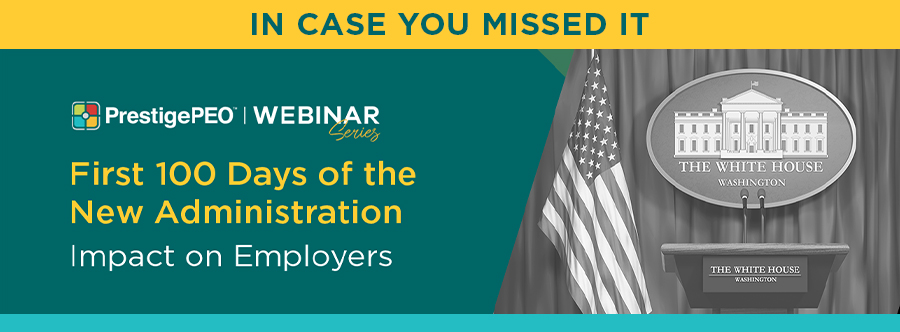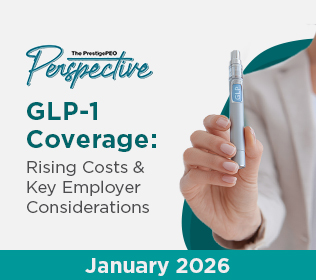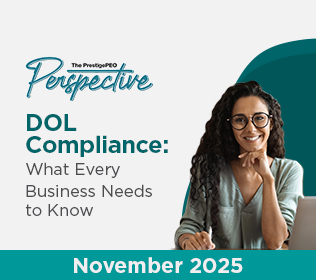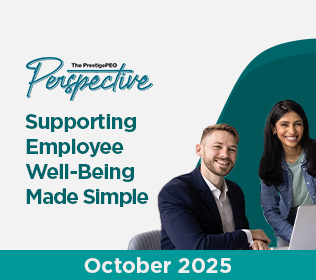

Learn What a PEO Can Do for Your Business
We’re celebrating National PEO Week this week, and there’s a good reason why. Professional Employer Organizations (PEOs) help small and medium-sized businesses like yours grow faster, reduce risk, and provide better employee benefits without the overhead of going alone.
When you partner with a PEO like PrestigePEO, you gain access to:
- Fortune 500-level benefits at small business pricing
- HR and compliance expertise to keep you protected
- Payroll and risk management support
- Tools to help you attract and retain top talent
- More time to focus on running and growing your business
According to NAPEO, businesses that use a PEO grow 7–9% faster, are 50% less likely to fail, and have lower employee turnover.
This week is more than a celebration; it’s a reminder that a PEO could be one of your most intelligent business decisions.

Retirement Plans Made Simple – and Rewarding
Earn Tax Savings with a Smarter 401(k) Strategy
Are you missing out on valuable tax credits?
Under the SECURE Act 2.0, small and mid-sized businesses can access significant tax incentives for offering a retirement plan, boosting employee satisfaction and retention.
If you have fewer than 100 employees, you may qualify for:
- 50–100% tax credits on plan setup (up to $5,000/year for 3 years)
- Up to $1,000 per employee for employer contributions
- $500/year for automatic enrollment
At PrestigePEO, we simplify the process through our Multiple Employer Plan (MEP), giving you access to competitive 401(k) options while we manage the administration, compliance, and fiduciary responsibilities. Contact us today to learn how we can help you save and grow.

Protect Your Business from Employee Lawsuits
Why EPLI is Essential for SMBs
In today’s litigious environment, small and mid-sized businesses (SMBs) face increasing risks of employee-related claims, such as wrongful termination, discrimination, and harassment. Without proper coverage, a single lawsuit can be financially devastating.
Employment Practices Liability Insurance (EPLI) provides crucial protection by covering legal fees, settlements, and judgments arising from such claims. It’s not just about insurance; it’s about ensuring the longevity and reputation of your business.
Discover how EPLI can safeguard your business and provide peace of mind.

Simplify HR Compliance for Your Business
Stay Compliant Without Overloading Your Team
Navigating the ever-evolving landscape of employment laws can be challenging for SMBs, especially with limited HR resources. Non-compliance can lead to costly penalties and disrupt your business operations.
PrestigePEO offers comprehensive HR compliance solutions tailored for SMBs. From proactive compliance management and payroll administration to expert HR support, we help ensure your business stays compliant, allowing you to focus on growth.

May is Mental Health Awareness Month
Supporting Employee Mental Health is Smart Business
Mental health challenges are on the rise, and they impact more than just individual well-being. They affect productivity, engagement, and retention across your organization.
This Mental Health Awareness Month, we’re highlighting how employers can take meaningful action. Our latest blog explores why offering mental health benefits isn’t just the right thing to do — it’s a strategic investment in your workforce.
This is a great place to start if you’re looking to attract and retain top talent while building a more supportive culture. Learn how mental health benefits can drive real business results.

First 100 Days – What Business Owners Need to Know
Catch Up on Key Policy Changes That Could Impact Your Business
New leadership in Washington means new rules for your business. Are you prepared?
Our recent webinar features legal and HR experts as they explain how the new administration’s early actions could directly impact small and mid-sized businesses.
Key topics include:
- New and revoked Executive Orders
- Agency-level changes that affect employers
- Recent court rulings shaping compliance
- Strategies to protect your business and adapt confidently
If you’re unsure how new regulations could affect your operations, this recording offers clarity and insight you need to stay informed and compliant in 2025 and beyond.

ADA Ruling Expands Employer Obligations
In our previous article on Tudor v. Whitehall Central School District, we discussed how the Second Circuit Court of Appeals clarified that employers may be required to provide reasonable accommodations under the Americans with Disabilities Act (ADA) even when an employee can perform the essential functions of their job without one. This insight remains timely and increasingly important, reflecting a broader, consistent interpretation emerging across the country.
While the Tudor decision directly applies to employers in the Second Circuit (New York, Connecticut, and Vermont), other federal appellate courts have already taken similar positions. The First (Maine, Massachusetts, New Hampshire, Puerto Rico, Rhode Island), Fifth (Texas, Louisiana, Mississippi), Sixth (Michigan, Ohio, Kentucky, Tennessee), Ninth (California, Arizona, Nevada, and others), Tenth (Colorado, Utah, Kansas, and others), Eleventh (Florida, Georgia, Alabama), and D.C. Circuits all agree that the ability to perform the job does not negate the need to assess and, where appropriate, provide reasonable accommodations.
This alignment signals that employers outside the Second Circuit should not rely solely on whether an employee performs well without support. Just because someone meets expectations does not automatically relieve an employer of its duty to explore and possibly provide accommodation.
This trend also underscores the need for HR professionals and managers to remain cautious when revising policies, re-evaluating long-standing accommodation, or responding to new requests. Even neutral policy changes, like the one in Tudor, which prohibited leaving campus during prep periods, can inadvertently revoke accommodations that should remain in place unless they create an undue hardship.
The ADA requirement to engage in an individualized, interactive process remains unchanged. What has shifted is the growing judicial consensus that this process must occur regardless of current performance levels, which is a subtle but essential distinction that employers should incorporate into their disability accommodation practices.
We encourage employers to revisit internal training and documentation protocols and ensure decision-makers understand this broader legal trend. Compliance isn’t the only goal; it’s also cultivating a fair and consistent workplace culture that balances business needs with employee well-being.
Navigating ADA compliance can be challenging as case law continues to evolve. At PrestigePEO, our HR and compliance experts are ready to guide your business through updated accommodation requirements and policy reviews. Contact us today to ensure your workplace remains compliant and inclusive.

Executive Order Limiting Disparate Impact Enforcement
A recent executive order alters how federal agencies enforce anti-discrimination laws, specifically targeting the use of “disparate impact” analysis. This legal theory examines whether neutral employment policies unintentionally harm protected groups, even in the absence of intent to discriminate. The government will reduce enforcement efforts while this discrimination remains unlawful under federal law.
The executive order aims to reduce the federal government’s role in enforcing these claims by directing federal agencies, including the EEOC and the Department of Justice, to suspend enforcement actions based on disparate impact claims. It also calls for reviewing and potentially reversing existing settlements and regulations that rely on these theories.
Employers can now anticipate fewer federal investigations and lawsuits stemming from unintentional discrimination. However, intentional discrimination and disparate treatment continue to be illegal and enforceable under Title VII and other laws. Additionally, many states and cities (such as California, New York, and Massachusetts) still permit disparate impact claims under their laws. These laws remain in effect, regardless of changes at the federal level.
Even though federal enforcement is slowing down, reviewing your policies for potential adverse impacts remains essential. Conducting impact analyses during hiring, layoffs, or policy changes can help you stay ahead of risks, particularly in states with strong anti-discrimination laws.
Finally, legal battles concerning this executive order are likely. Courts may block certain parts, or future administrations might reverse it. Until then, the most effective path forward is a balanced approach, involving compliance with state laws and monitoring federal developments.
At PrestigePEO, we help businesses navigate evolving regulations and reduce risk. So, you can stay focused on growth, not guesswork. Contact us to learn more!

USCIS Releases Updated Form I-9 and E-Verify Terminology Changes
On April 2, 2025, the U.S. Citizenship and Immigration Services (USCIS) released a new version of Form I-9, which all U.S. employers must use to verify the identity and work authorization of new hires. While the changes are primarily editorial, they reflect updated federal terminology and privacy guidance and may require employers to review and adjust onboarding processes and internal systems.
Key Form I-9 Updates
The latest Form I-9, dated January 30, 2025, expires on May 31, 2027, and includes three changes:
- The term “gender” is now “sex” in two List B identity document sections.
- “Noncitizen authorized to work” has reverted to “alien authorized to work” in Section 1.
- The DHS Privacy Notice states that DHS may share the information provided on the form with authorized organizations.
Valid Form I-9 Editions
As of now, the following three versions of Form I-9 remain valid:
- August 1, 2023, edition, expiring July 31, 2026
- August 1, 2023, edition (re-released August 2, 2024), expiring May 31, 2027
- January 30, 2025, edition, expiring May 31, 2027
Employers can use these forms until they expire. If you have the July 2026 version, update your systems by that date to reflect the new expiration. The edition and expiration date are located in the top-right corner of the form.
E-Verify Language Update
As of April 3, 2025, E-Verify will use “An alien authorized to work” instead of “A noncitizen authorized to work.” Employers should use this term in E-Verify cases, regardless of the Form I-9 version.
Action Items for Employers
- Review and begin using January 30, 2025, Form I-9 as appropriate.
- Confirm internal systems reflect the correct expiration dates for all valid forms.
- Train staff to select the correct citizenship status in E-Verify.
- Review onboarding protocols to ensure compliance with updated language.
PrestigePEO helps businesses stay ahead of evolving requirements like these, contact us to learn how we can ensure your business stays compliant!

NYC – Delivery Worker Minimum Wage Increase
New York City has finalized the nation’s first minimum pay rate for app-based restaurant delivery workers, setting it at $21.44 per hour before tips as of April 2025. This final rate reflects both a 7.41% inflation adjustment and the full implementation of the city’s groundbreaking 2023 minimum pay rule, which established the first-ever hourly wage standard for this workforce. Designed to move delivery workers beyond unpredictable, tip-dependent earnings, the rule required phased increases to reach the current rate. Enforced by the NYC Department of Consumer and Worker Protection (DCWP), the law began taking effect in late 2023 to address wage disparities in the gig economy, where some workers previously earned as little as $5.39 per hour.
Employers that use third-party delivery platforms—such as DoorDash, Uber Eats, Grubhub, Postmates (now part of Uber Eats), and Relay Delivery—should confirm that these vendors are complying with New York City’s minimum pay rule for app-based delivery workers.
Staying ahead of evolving labor laws can be challenging, PrestigePEO is here to help. Connect with our team to learn how we support businesses like yours with ongoing compliance guidance and vendor oversight.




